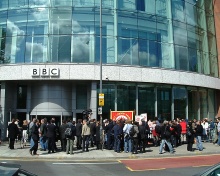BBC TV News facing series of strikes

May 2005 - Pickets outside TV Centre, headquarters of BBC News
BECTU members in BBC News are set to take strike action in two disputes over value-for-money savings.
500 of the union's members in Television News have voted for industrial action against compulsory redundancies in a ballot which closed today (February 9).
Their vote followed closely after another ballot announcement in which members in News Production Facilities (NPF), a department which provides engineering and technical support for BBC News, voted to resume a strike campaign against enforced changes to their rota patterns.
Majorities in favour of strike action in both ballots were over 80%. Both groups of members will be on strike for 24 hours on February 26th, when NUJ members are expected to join in, and industrial unrest will continue with stoppages among BECTU's NPF members for the following three days. No times have yet been released for the NPF strikes.
Action on the 26th was prompted by a breakdown in talks about redundancies resulting from Mark Thompson's Value for Money savings, aimed at cutting £355 million per year from BBC spending.
BBC News announced last month that five staff were to be given notice of compulsory redundancy, and selection procedures would commence to pick another five in coming weeks.
Both BECTU and the NUJ are adamantly opposed to compulsory redundancies, although they have been willing to agree to job cuts that are achieved voluntarily, or through natural wastage.
BECTU's BBC Supervisory Officer, Luke Crawley, said: "The BBC has achieved nearly 4,000 job cuts by calling for volunteers, and it seems perverse for BBC News to try and force through just 10 post closures."
News management have also provoked anger in the NPF department by announcing that controversial new rota patterns will be imposed on staff from March 10 without any union agreement.
Almost 100 NPF BECTU members took strike action in November last year after being confronted with new rotas that increased the number of working days for many staff, and introduced flexible and unpredictable scheduling.
The strike led to a renewed round of talks in which management made a number of concessions, but the revised proposals were rejected by a large majority of members in a consultative ballot. BBC News responded by setting a date for the new rotas to take effect, and a meeting of members on February 9 decided to continue with industrial action in protest at the changes.
Union officials believe that the industrial action against cuts in News could be a foretaste of wider unrest if the BBC responds to its disappointing new licence increase formula by launching another round of redundancies.
Up to 4,000 jobs have already gone as a result of savings which started in 2005, prompting a one-day strike across the BBC, and many areas are now running on critically-low staffing levels.
Unions have called on the BBC to identify activities, and future plans for expansion, which will now be abandoned, and have pledged to block any move that involves staff savings to make up the £2.2 billion shortfall in the Corporation's income between now and 2012.
